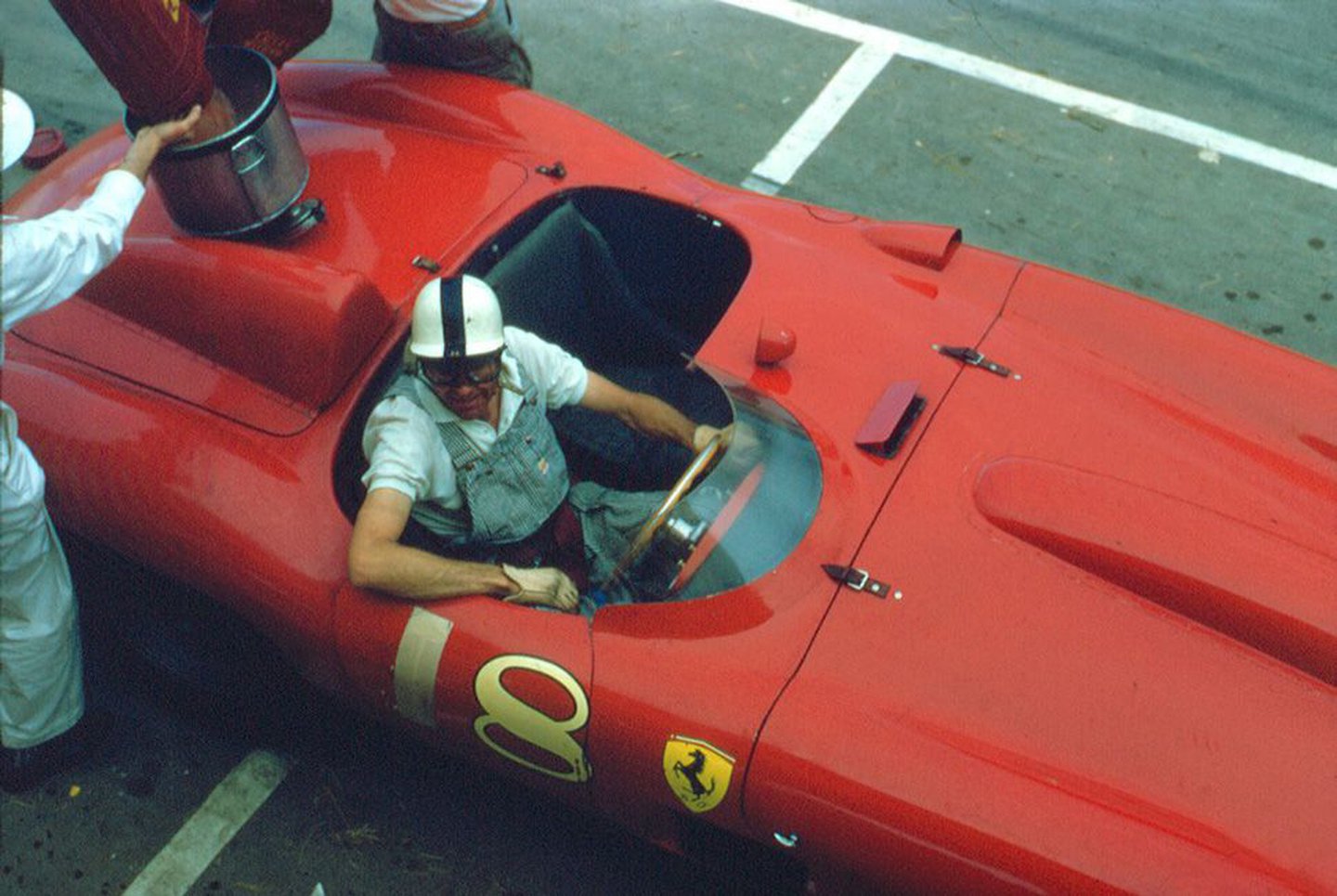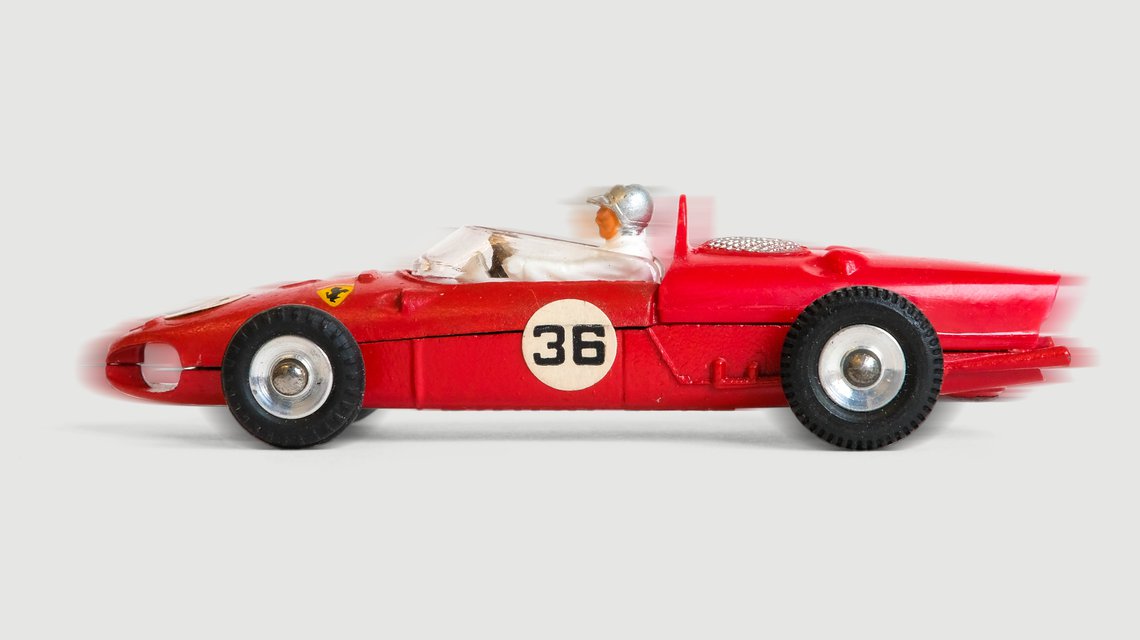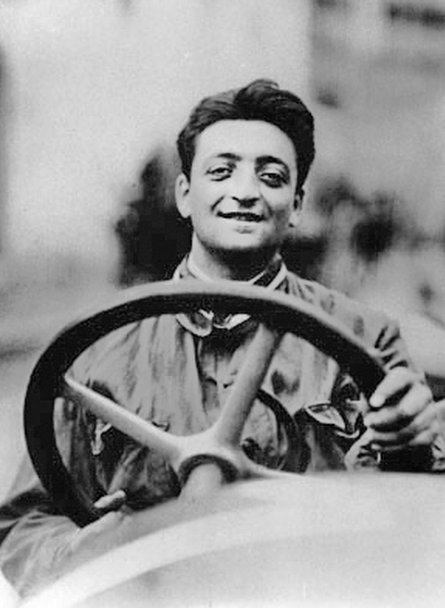

→
Scroll to discover more
The story of Ferrari
The Beautiful and Damned

Sometimes, although less often than we might suppose, a piece of design becomes a work of art.
As evidence I offer… Ferrari.
I should declare an interest here: I don’t care. Cars leave me cold, I can’t tell one from another. I have never driven one, and have absolutely no interest in ever doing so.
But Ferrari are something else. Because he was.
He started to make racing cars in 1943. It was ridiculous. There was a war on, not that Enzo noticed. In his first two years, Italy was ruined. His factory was, literally, a bombsite (our fault, I’m afraid). The roads around it were wrecked by bombing, systemically devastated by the retreating German army, and what remained of the surface was chewed to pieces by tanks. Mostly impassable, the locals had resorted to using horses.
In this environment, Enzo Ferrari decided to make cars that would only perform on a surface as smooth as glass. Racing cars. And not just the fastest the world had ever seen, they were also going to be the most beautiful. Because Enzo was Italian.
As evidence I offer… Ferrari.
I should declare an interest here: I don’t care. Cars leave me cold, I can’t tell one from another. I have never driven one, and have absolutely no interest in ever doing so.
But Ferrari are something else. Because he was.
He started to make racing cars in 1943. It was ridiculous. There was a war on, not that Enzo noticed. In his first two years, Italy was ruined. His factory was, literally, a bombsite (our fault, I’m afraid). The roads around it were wrecked by bombing, systemically devastated by the retreating German army, and what remained of the surface was chewed to pieces by tanks. Mostly impassable, the locals had resorted to using horses.
In this environment, Enzo Ferrari decided to make cars that would only perform on a surface as smooth as glass. Racing cars. And not just the fastest the world had ever seen, they were also going to be the most beautiful. Because Enzo was Italian.

Enzo Ferrari, 1920s
And being Italian, what he needed to motivate him was an enemy. Ideally, the enemy would start out as a close friend: the art of vendetta depends on the participants loving one another in Act One.
He found the perfect target in Alfa Romeo. He adored Alfa. They had trained him, shaped him from a boy. He drove for them, proudly racing in their colours. He is photographed in their overalls, a laurel wreath around his neck. It was the greatest moment in his life.
So, naturally, he dedicated his entire being to crushing Alfa Romeo. He completely disregarded Mercedes Benz and ignored Bentley. Didn’t even see them. There was only one other car on the track.
He found the perfect target in Alfa Romeo. He adored Alfa. They had trained him, shaped him from a boy. He drove for them, proudly racing in their colours. He is photographed in their overalls, a laurel wreath around his neck. It was the greatest moment in his life.
So, naturally, he dedicated his entire being to crushing Alfa Romeo. He completely disregarded Mercedes Benz and ignored Bentley. Didn’t even see them. There was only one other car on the track.
Enzo Ferrari decided to make cars that would only perform on a surface as smooth as glass. Racing cars. And not just the fastest the world had ever seen, they were also going to be the most beautiful.
And, finally, after a death-defying battle, he defeated Alfa in the Grand Prix at Silverstone in 1951 (…and did these feet, in ancient times, tread upon England’s pastures green. Elvis never came here, but Ferrari did. It’s some consolation.)
It was an astonishing victory. The upstart (or, as we would now say, startup) had defeated one of the greatest car makers in the world. In fact, on that day, all of the greatest, not that he cared about the others.
So, how did it feel? A young journalist was naïve enough to ask Ferrari.
“Today, I have killed my mother.”
For that remark alone, Ferrari deserves immortality.
Paul Cardwell, The Laughing Saboteur
It was an astonishing victory. The upstart (or, as we would now say, startup) had defeated one of the greatest car makers in the world. In fact, on that day, all of the greatest, not that he cared about the others.
So, how did it feel? A young journalist was naïve enough to ask Ferrari.
“Today, I have killed my mother.”
For that remark alone, Ferrari deserves immortality.
Paul Cardwell, The Laughing Saboteur
Featured stories
See all of our stories 